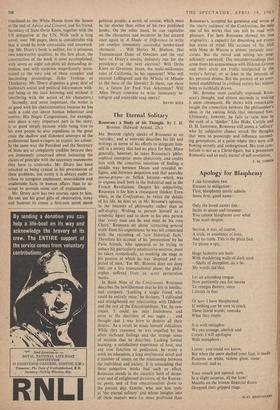The Eternal Solitary
Rousseau : a Study of his Thought. By J. H. Broome. (Edward Arnold, 25s.)
MR. BROOME rightly speaks of Rousseau as an `outsider,' and at intervals describes his life and writings in terms of his efforts to integrate him- self in a society that had no place for him. More generally, however, he takes Rousseau's 'philo- sophical enterprise' more objectively, and credits him with the conscious intention of finding a middle way between Deism and revealed re- ligion, and between despotism and that anarchic amour-propre—or Selfish Interest—which was to express itself both in the Industrial and in the French Revolutions. Despite his subjectivity, Rousseau is for him a consequent thinker. Even when, in the Confessions, he twists the details of his life, he does so, in Mr. Broome's opinion, in the interests of philosophy rather than of self-display. Wishing to present himself as a symbolic figure and to show in his own person that 'every man can be and must be his own Christ,' Rousseau set about 'extracting general truth' from his experiences; he was not concerned with the recording of 'raw historical facts.' Therefore his account of his 'persecution' by his Paris friends, who appeared to be trying to seduce his particularly unattractive mistress, must be taken symbolically, as marking the stage in his passion at which he was 'despised and re- jected of men.' Yet Mr. Broome does not deny that, on a less transcendental plane, the philo- sopher suffered from an acute persecution mania.
In Book Nine of the Confessions, Rousseau describes the bewilderment that he felt in intellec- tual company. 'Lacking a single friend who could be entirely mine,' he declares, 'I cultivated and strengthened my relationship with Diderot' and the rest of the Encyclopddistes. Yet, he con- tinues, 'I could see only foolishness and error in the doctrines of our sages . . . and thought that I was born to destroy all their deceits.' As a result he made himself ridiculous. While they reasoned, he was impelled by his often inchoate feelings and the strange sense of mission that he describes. Lacking formal learning, a satisfactory experience of love, and any true function or profession, he wrote a work on education, a long sentimental novel and a number of essays on the relationship between the individual and society. It is astounding that these subjective works had such an effect. Rousseau stands in the ancestry both of demo- crats and of enlightened dictators, of the Roman- tic poets, and of free educationalists down to the present day. Goethe, who saw him truly as 'the eternal solitary' and whose insights into all these matters were far more profound than Rousseau's, accepted his greatness and wrote of the 'starry radiance' of the Confessions, the only one of his works that can still be read with pleasure. For here Rousseau showed his true originality : a capacity for describing not events but states of mind. His account of the idyll with Mme de Warens is almost certainly inac- curate. But the mood and setting are mag- nificently conveyed. The misunderstandings that arose from his acquaintance with Diderot, Grimm and their circle are freely interpreted in the writer's favour, or at least in the interests of his personal drama. But the portrait of an emo- tional muddlehead in civilised society has seldom been so faithfully drawn.
Mr. Broome most carefully expounds Rous- seau's thought, and almost succeeds in making it seem consequent. He shows with remarkable insight the connection between the philosopher's ideas in the various fields that interested him. Ultimately, however, he fails to raise him to the rank of a 'thinker.' Like Blake, Carlyle and D. H. Lawrence, Rousseau still seems a 'solitary' who by subjective chance struck the thoughts that were to preoccupy and influence succeed- ing generations, at a point where they were still flowing secretly and underground. His true sym- bolism is not as a Christ-figure, but a premature Romantic and an early master of self-revelation.
3. M. COHEN


































 Previous page
Previous page